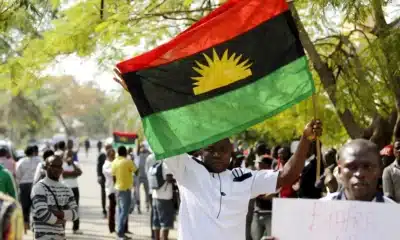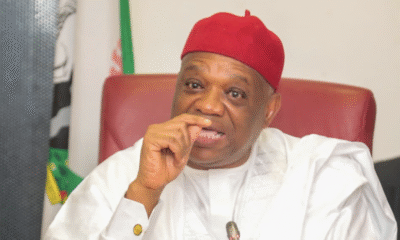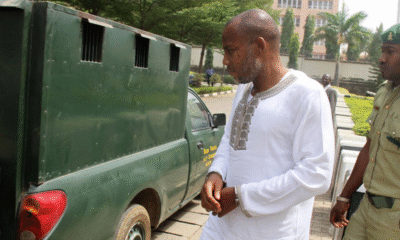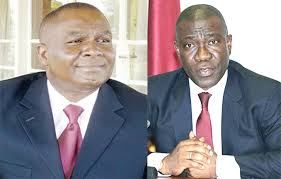Breaking News
Moving Nnamdi Kanu To Sokoto Prison Could Trigger National Crisis — Lawyer
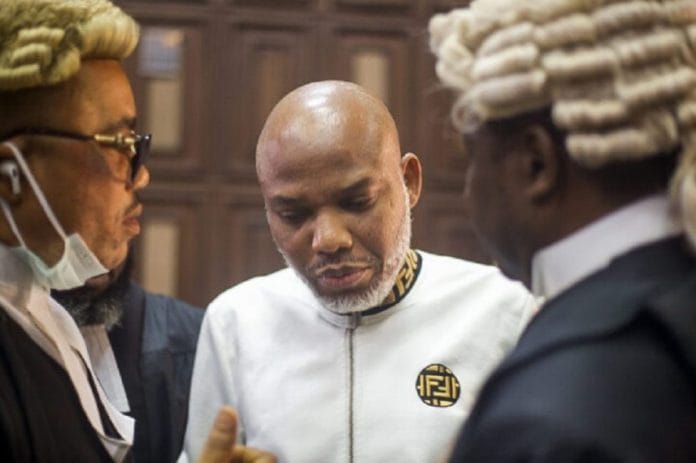
A lawyer and researcher on international laws of war, Chief Emmanuel Nwibo, has condemned the transfer and public disclosure of the location of the detained leader of the Indigenous People of Biafra (IPOB), Nnamdi Kanu, describing the action as a “tragic security flaw” and “a miscalculation with potentially far-reaching consequences.”
Nwibo, a former Leader of the Ebonyi State House of Assembly, said announcing that Kanu is being held in Sokoto Prison has exposed him to extreme danger in a region he described as a “terrorist-infested zone.”
Nwibo likened Kanu’s situation to that of the slain military officer, General Uba, who was murdered by suspected terrorists after fleeing an ambush.
According to him, “Nnamdi Kanu, like General Uba, is a high-value target internationally for bandits and jihadists. They can do anything to get rid of him… even with international assistance, to score a painful goal and trigger confusion.”
He insisted that Kanu’s profile as a separatist leader makes him an even more sensitive target.
Nwibo described the decision to move Kanu to Sokoto as an act of poor strategic judgement.
He said: “Exporting a high-profile prisoner like Nnamdi Kanu to a far-away terrorist-infested North is a miscalculation and an error taken too far that may bring far-ending and avoidable consequences.”
He argued that the move violates Kanu’s right to proximity to his lawyers and exposes him to ultimate danger.
“His right to nearness to his lawyers and justice is not only being violated but exposed to ultimate danger… a resemblance of the case of Kashimawo Abiola in the 90s,” Nwibo warned.
Citing the recent mass abductions in Niger State, he questioned why the government would take such a risk given the insecurity plaguing the North.
He said: “If up to three hundred students can be abducted in nearby Niger State with no rescue in sight, then how much more a prisoner accused of inciting hatred and attacks on the Fulani?”
He further described Sokoto as “the capital of the Fulani with high jihadist inclinations and so much hatred already in the air.”
Nwibo criticised what he termed reckless information management by authorities, saying leaders must know when to withhold sensitive details.
“It is the same as announcing that a General who escaped an ambush has made his way back to base… without waiting for the natural conclusion of events,” he said.
He added that the case of General Uba illustrated how information lapses could jeopardise lives.
The lawyer warned that Kanu’s presence in Sokoto could embolden hostile groups and destabilise the country if anything happens to him.
He said: “Taking him to Sokoto Prisons is a miscalculation and a time bomb on our national cohesion. We are sitting on the brink of a national disaster and creating an opportunity which the enemies of Nigeria can harvest easily.”
“Striking the facility where Nnamdi is being kept or even a mere rumour of that can trigger a national abnormality.”
Nwibo suggested that concealing Kanu’s location from the public—while keeping the family informed—would have been a safer option.
“We cannot afford to make Nnamdi Kanu a soft target or one of the collateral damages arising from the war against banditry and jihadism,” he said.
He stressed that Kanu is “not a terrorist, but a separatist leader tried on a non-existing terror law.”
Nwibo urged authorities to reconsider their strategy to prevent what he described as an avoidable national tragedy.
“A stitch in time saves nine,” he concluded.

